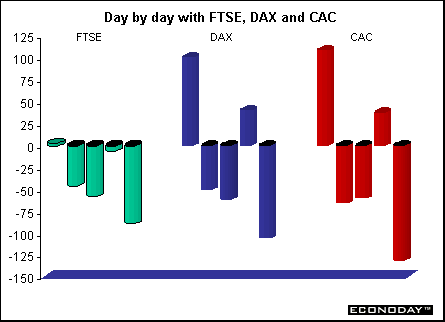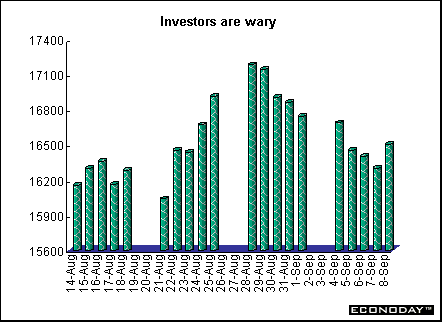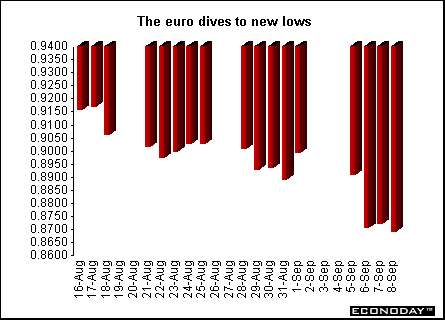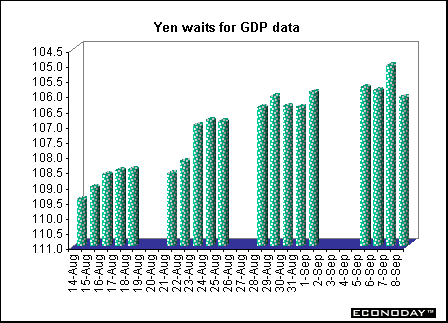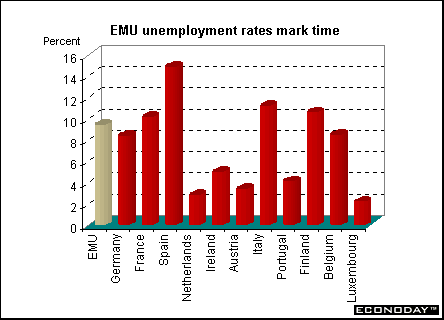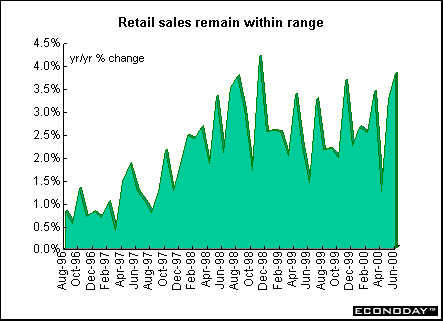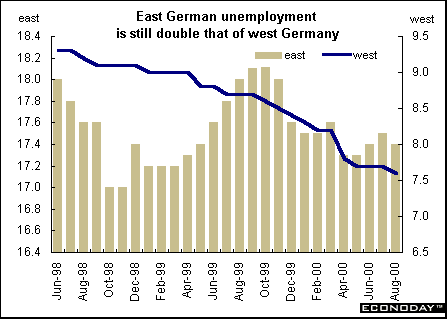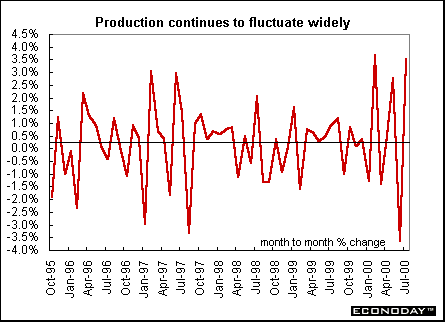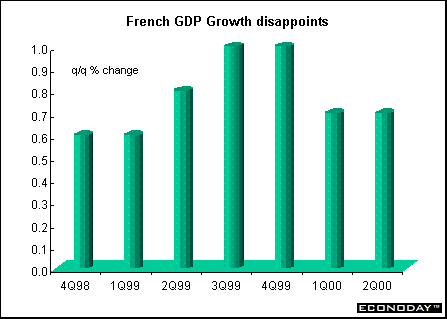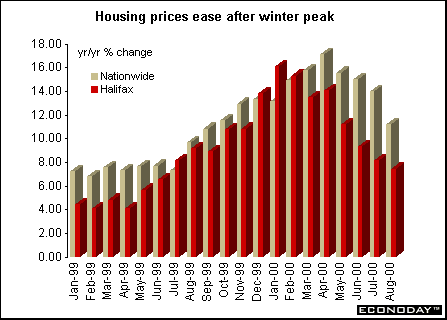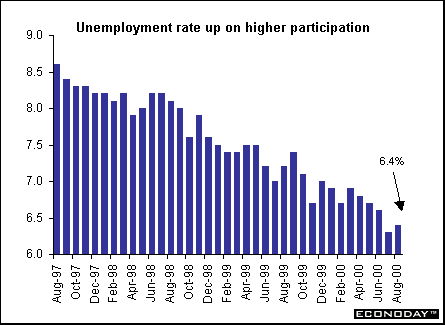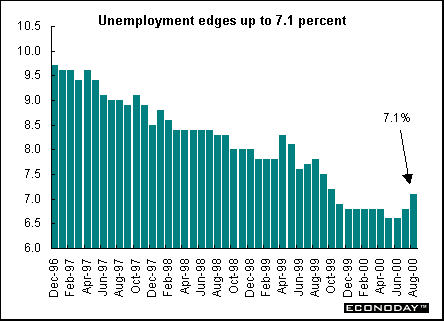| Previous Articles |
|
The euro wilts some more The equity markets in Europe, Britain and the Americas took a breather after last week's gains. The Asian markets continued to fret over chip supplies and prices, while European markets took profits after last week's gains. The Toronto Stock Exchange Composite 300 returned from a long weekend along with U.S. markets and paused for reflection. The high flying TSE was down 5 percent on the week. The Mexican Bolsa was the only index tracked here that rose on the week, up 2.69 percent. As crude oil prices rose above $35 a barrel to a 10 year high on speculation OPEC's production increase might not be enough to meet demand, the markets suffered from a case of jitters. Analysts predicted OPEC would increase daily output by 500,000 to 800,000 barrels, but many estimate that a million barrel increase is needed to calm the markets. Crude oil for October delivery on the New York Mercantile Exchange ended the week at $33.70 after reaching $35.46, the highest price since the Persian Gulf War in November 1990.
Canadian and United States markets were closed on Monday. Europe and Britain
European and British shares fell amid anxieties about the impact of rising oil prices on profits. Higher oil prices, while good for the energy industry, eat into other corporate sectors' earnings. And the key factor undermining share prices was concern that recent rises in crude oil prices will cut corporate profits. In Britain, the markets hesitated before the Bank of England's monetary policy meeting even though no action was expected. After the meeting, the policy setting interest rate remained at 6 percent, 50 basis points below the United States and 150 basis points higher than the European Monetary Union. On the week, the FTSE 100 closed at 6600.70, down 194.3 points or 2.86 percent. On the continent, the Frankfurt DAX closed at 7267.77, down 76.90 points or 1.05 percent and the Paris CAC closed at 6703.36, down 110.30 points or 1.62 percent. Asia Japan's Nikkei 225 rose for the first time in nine days on Friday. Thursday's rise in the Nasdaq outweighed the negative impact of Moody's downgrade of Japan's yen denominated debt. The stock market more or less ignored the downgrade of domestic currency debt, from Aa1 to Aa2 with a negative outlook. But the currency market did not and the yen fell. The Nikkei 225 had another negative week overall, closing at 16,501.55, down 238.23 points or 1.42 percent.
In other markets, the South Korean Kospi closed at a 2000 low of 653.68. On the week, the index was down 38.51 points or 5.56 percent primarily on profit concerns. The Hong Kong Hang Seng was down 58.16 points or 0.34 percent to end the week at 16,501.55 and the Australian All Ordinaries closed at 3278.90, down 14.5 points or 0.44 percent. Currencies The continental divide
The euro has been under pressure following a public disagreement among politicians on the desirability of a weak currency. European Union policy makers sprang to the defense of the euro, insisting that it was undervalued on foreign exchange markets and that they had no interest in a weak currency. The Bundesbank and European Commission released statements designed to repair the damage inflicted earlier in the week when Gerhard Schroeder, Germany's chancellor, suggested the euro's low exchange rate was cause for satisfaction since it stimulates exports. The European Monetary Union finance ministers and the European Central Bank issued a statement Friday afternoon saying they shared the view that growth remains very robust in the EMU. They also said that fiscal consolidation and the reform effort, especially in the tax field, are well underway and stressed their determination to speed up the process to promote necessary structural reforms. Both the foreign ministers and the ECB reiterated their common concern that the current level of the euro does not reflect the strong economic fundamentals of the euro area and said they will follow the situation closely. They ended by saying that a strong euro is in the interest of the euro area. There was no mention of intervention in the currency markets. However, in comments after the meeting, ECB vice chairman Noyer reminded everyone that intervention is a tool which is available at any time. Contributing to the euro's weakness has been growing pessimism among the Japanese who have suffered huge losses on the their large European government bond portfolios. Japanese institutions are also selling euros to bring home money before September 30, the end of the first half of the their fiscal year. They need to sell to prop up balance sheets hurt by euro weakness and recent stock market declines at home. The yen rose in value during the week against both the euro and dollar primarily because of euro/yen trading traffic. The Bank of Japan meets on Thursday after the release of second quarter gross domestic product data. Anticipation of a good GDP number, which has in part contributed to the rising yen, was quashed Thursday and Friday when investment data were weaker than expected. (See indicator scoreboard below.) The Bank of Japan is expected to leave interest rates unchanged at 0.25 percent.
Moody's finally downgraded Japan's credit rating Friday to Aa2, saying the government is running up too much debt in its attempts to stir up economic growth. Japan originally lost its Aaa rating in November 1998. As to be expected the yen fell even though the Nikkei chose to ignore the news. Indicator scoreboard The August Reuters services index rose slightly indicating that sector growth accelerated during the month. The services index inched up to 60.3 in August from 60.1 in July, exactly reversing the slight decline posted the month before. An index reading above 50 signals that activity is expanding, a reading below 50 that it is contracting. July industrial producer prices (excluding construction) rose 0.5 percent and 5.5 percent when compared with last year. As in previous months, the main factor behind the strong overall PPI increase was a 0.8 percent monthly and 11.4 percent annual increase in intermediate goods prices. This category contains oil prices and other commodity imports, which were also strongly affected by the weak euro. July seasonally adjusted unemployment rate remained unchanged at 9.1 percent - its lowest level since July 199 - when it was also at 9.1 percent. Of the eight EMU nations reporting data, unemployment fell in three, remained unchanged in four and rose in one.
June real seasonally adjusted retail sales rose 0.4 percent and 1.8 percent when compared to a year ago. All three major subcategories of retail sales fell on the month. Household goods rose 3.0 percent and food drink and tobacco were up 2.2 percent when compared with a year ago. However, sales of textiles, clothing and footwear were down 1.6 percent on the year. Many analysts are reluctant to forecast retail sales because of high volatility in the new series and the differing methodologies by countries to calculate them.
Germany - July manufacturing orders rose 0.7 percent, driven by stronger foreign demand (up 2.6 percent) and the weak euro. Foreign capital goods demand was up 5.3 percent, while foreign durable and non-durable consumer goods demand were up 7.6 percent. Domestic orders, on the other hand, fell for the second month in a row (down 0.8 percent in July after a drop of 1.2 percent in June). Orders rose 0.4 percent in west Germany while orders in east Germany jumped 5.2 percent. August seasonally adjusted unemployment rate stayed at 9.5 percent, although the numbers of unemployed fell again due solely to an improvement in west Germany. West Germany's unemployment rate slipped to 7.6 percent while east Germany's rate remained at 17.4 percent. The August data again highlight the divergent economic conditions in east and west Germany. West German seasonally adjusted unemployment declined for the 15th straight month. East German seasonally adjusted unemployment, on the other hand, increased for the third month in a row and fifth time in the last six months.
August final seasonally adjusted consumer prices were unchanged on the month and up 1.8 percent on the year. For the six months to August, consumer prices rose at an annualized rate of 1.7 percent, down from July's 2.1 percent. July industrial production rose 3.5 percent. All output categories climbed led by manufacturing, which rose 3.4 percent after a 3.1 percent decline in June. West German output rose 3.5 percent and in the east, output was up 4.4 percent. On a seasonally adjusted basis, industrial production rose 3.5 percent on the month and 5.7 percent when compared with last year. July west German industrial production was up 3.5 percent and 6.3 percent when compared with last year while in east Germany industrial production rose 4.4 percent on the month and 0.9 percent on the year.
France - Second quarter seasonally and workday adjusted gross domestic product rose 0.7 percent and 3.4 percent when compared with last year. Household spending slowed sharply to 0.2 percent after climbing 0.8 percent in the first quarter. Business investment jumped 1.9 percent.
Italy - July non-EU merchandise trade surplus was L2.810 trillion, substantially lower than the L3.945 trillion surplus in July 1999. Non-EU imports were up 13.6 percent when compared with last year while exports rose by 12.5 percent. Again, the surplus decline was mostly due to higher oil prices. June's trade deficit with its EU trading partners was L44 bln (EU trade data are reported a month behind non-EU trade). EU exports rose 12.5 percent from June 1999 and imports were up 13.6 percent. June's world trade surplus was L178 bln. Imports were up 23.8 percent and exports were up 13.4 percent when compared with last year. Britain - The two measures of house prices diverged, going in opposite directions during August. However, when compared with last year, house prices continued to ease. August seasonally adjusted Nationwide house price index fell 0.6 percent on the month but rose 11.2 percent on the year. In July, house prices dropped 0.2 percent on the month but were up 13.9 percent on the year. However, August Halifax seasonally adjusted house prices rose 0.5 percent. The annual rate slowed for the fourth consecutive month, up 7.4 percent on the year. The annual rate of increase is now at its lowest since June 1999 when it stood at 6.6 percent.
July manufacturing output fell 0.3 percent but is up 0.7 percent when compared with a year ago. In the three months to July, manufacturing output rose 0.5 percent and was up 1.5 percent on the year. Total industrial output remained unchanged on the month in July and was up 1.1 percent on the year. In the three months to July, industrial output rose 1.2 percent on the quarter and by 1.8 percent on the year. Seasonally adjusted housing starts in the three months to July rose 5 percent compared with the previous quarter and 6 percent when compared with last year. Total completions in May to July were down 4 percent on the previous quarter and 5 percent on the year earlier. Asia Second quarter business spending on new factories and equipment rose a much lower than expected 2.2 percent when compared with a year earlier. That follows a 3.3 percent increase in the first quarter. July private sector machinery orders (excluding volatile ships and power company orders) fell 11.7 percent after rising 14.4 percent in June. The data are seen as a leading indicator of corporate capital investment six to nine months ahead. August domestic wholesale prices rose 0.2 percent and were flat when compared with a year ago. The export price index increased 0.1 percent on the month in terms of contract currencies and was up 0.1 percent on the month in yen terms but down 3.6 percent on the year in yen terms. The import index was up 0.1 percent in terms of contract currencies and rose 0.5 percent in yen terms, up 4.6 percent from the previous year in yen terms. Australia - August employment rose another 24,100 jobs after the 74,800 gain in July, highlighting the underlying strength of the labor market. The unemployment rate rose to 6.4 percent, reflecting an increase in the participation rate, which climbed to an all time high of 64.1 percent.
Americas
Second quarter capacity utilization rose to 87.9 percent, marking the seventh straight quarter of increasing rates. For the first half of 2000, industries have been operating at rates not seen since the mid-1960s. All sectors except construction contributed to the increase in the rates, but the main impetus came from the manufacturing sector, which was up to 88.4 percent of capacity. Producers of computers and other high technology equipment benefited from strong export demand as well as robust levels of business investment. Manufacturers raised their rate of capacity use for a seventh straight quarter, bringing the level to 88.4 percent. BOTTOM LINE Both the Bank of Japan and the European Central Bank have monetary policy meetings on Thursday. No action is expected by either bank. OPEC meets this weekend amid predictions that no matter how much they raise output, it will not be enough to satisfy demand. Prices now are close to peaks.
Release dates are subject
to change. |
|||||||||||||||||||||||||||||||||||||||||||||||||||||||||||||||||||||||||||||||||||||||||||||||||||||||||||||||||||||||||||||||||||||||||||||||||||||||||||||||||||||||||||||||||||||||||||||||||||||||||||||||||||
